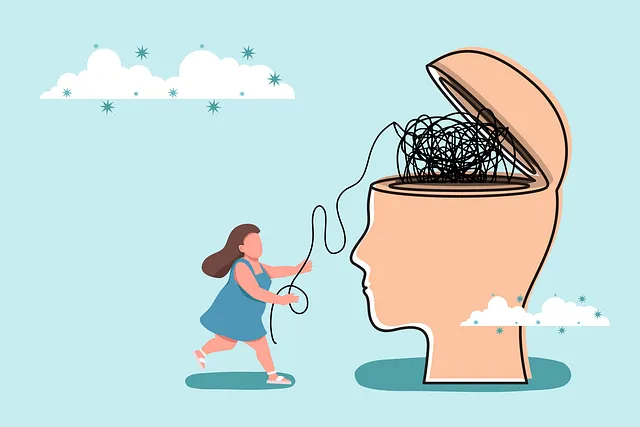In Colorado Springs, the Kaiser Permanente behavioral health center addresses mental health challenges through comprehensive services, innovative initiatives like podcasts and self-care routines, and educational programs promoting emotional healing. Their strategic approach, combining therapy, counseling, and support groups, empowers individuals with coping skills for long-term well-being, destigmatizing mental health discussions and enhancing community mental wellness.
“Mental health education is pivotal in fostering well-being, especially in communities like Colorado Springs. This article explores the design of comprehensive programs, drawing insights from the Kaiser Permanente Behavioral Health Center’s successful model. We delve into the challenges and needs specific to this region and present a strategic framework for engaging educational initiatives.
By examining program design, implementation, and evaluation, we aim to highlight effective strategies that can be adapted to improve mental health literacy and access to care, particularly in the context of Kaiser Permanente behavioral health services in Colorado Springs.”
- Understanding Mental Health: Challenges and Needs in Colorado Springs
- Kaiser Permanente Behavioral Health Center: A Model for Comprehensive Care
- Designing Educational Programs: Engaging and Effective Strategies
- Implementing and Evaluating: Measuring Success and Continuous Improvement
Understanding Mental Health: Challenges and Needs in Colorado Springs

In Colorado Springs, understanding mental health and its associated challenges is more than a simple awareness; it’s a pressing need. The Kaiser Permanente behavioral health center serves as a beacon for those seeking support, highlighting the growing demand for accessible and comprehensive mental wellness services. Many residents face barriers to care, from stigma and lack of information to financial constraints, which significantly impact their ability to prioritize mental health. This is especially pertinent in a rapidly changing urban landscape where stress and anxiety can be exacerbated by the hustle and bustle of daily life.
Addressing these challenges requires a multi-faceted approach. The Mental Wellness Podcast Series Production has emerged as an innovative tool, offering accessible information and personal narratives that destigmatize mental health discussions. Alongside this, Self-Care Routine Development for Better Mental Health is gaining traction as a means to empower individuals to take proactive steps towards well-being. Additionally, Coping Skills Development programs equip residents with valuable tools to navigate life’s stressors, ensuring they have the resilience to cope and thrive in their community.
Kaiser Permanente Behavioral Health Center: A Model for Comprehensive Care

The Kaiser Permanente Behavioral Health Center in Colorado Springs stands as a beacon of comprehensive mental health care. This center integrates various services, including therapy, counseling, and support groups, to address the complex needs of individuals facing mental health challenges. By fostering a holistic approach, the program prioritizes not just symptom relief but also the development of emotional healing processes and enhanced mental wellness.
In line with best practices in mental health education, the center employs innovative empathy-building strategies to bridge the gap between patients and caregivers. Through collaborative care models and tailored mental wellness coaching programs, Kaiser Permanente aims to empower individuals with the skills and knowledge necessary for long-term well-being. This multi-faceted development ensures that patients not only receive treatment but also gain insights into maintaining a healthy mind in an increasingly demanding world.
Designing Educational Programs: Engaging and Effective Strategies

Designing educational programs that promote mental well-being is an essential aspect of comprehensive care, especially in communities like Colorado Springs where organizations like the Kaiser Permanente behavioral health center play a vital role. Engaging and effective strategies are key to creating impactful learning experiences. One powerful approach is adopting interactive methods that encourage active participation. For instance, group discussions, role-playing scenarios, and peer support networks can foster open conversations about mental health, reducing stigma associated with seeking help, as often seen in Mental Illness Stigma Reduction Efforts.
Incorporating practical tools for self-care and stress management is another effective strategy. Teaching techniques like mindfulness meditation, cognitive behavioral therapy (CBT) skills, and burnout prevention strategies empowers individuals to take charge of their mental health. By combining theoretical knowledge with hands-on activities, these programs can enhance Self-Esteem Improvement, enable participants to develop coping mechanisms tailored to their unique needs, and promote long-lasting positive changes in their mental well-being.
Implementing and Evaluating: Measuring Success and Continuous Improvement

Implementing a mental health education program requires strategic planning and evaluation to ensure its effectiveness and adaptability. At the Kaiser Permanente behavioral health center in Colorado Springs, success is measured through a multi-faceted approach. This includes collecting participant feedback to understand the impact of various components like Mental Wellness Coaching Programs Development and Public Awareness Campaigns Development. By assessing self-reported improvements in mental health and engagement with services, the center can gauge the program’s reach and effectiveness.
Continuous improvement is fostered through regular review and refinement based on data and feedback. This iterative process involves adjusting Self-Awareness Exercises and other educational content to meet evolving needs. Such a dynamic approach ensures that the program remains relevant, engaging, and aligned with best practices in mental health education, ultimately enhancing overall community mental wellness.
Mental health education programs, inspired by models like the Kaiser Permanente Behavioral Health Center in Colorado Springs, offer a promising path forward. By integrating comprehensive care and employing engaging strategies, these initiatives can significantly improve mental well-being within communities. Through effective implementation and continuous evaluation, we can ensure that educational programs meet the unique challenges and needs of diverse populations, fostering a healthier and more resilient society. The Kaiser Permanente approach serves as a powerful example, highlighting the potential for positive change when accessible, high-quality mental health education becomes a priority.






